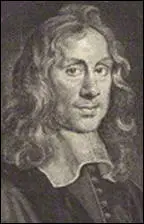Philip Warwick

Philip Warwick, the only son of Thomas Warwick, the organist at Westminster Abbey and Elizabeth Somerville Warwick, was born on 24th December, 1609. He was educated at Eton College and probably attended Cambridge University before he spent time travelling in France and Switzerland.
Warwick married Dorothy Hutton in 1634. He became secretary to George Goring, a distant relative. He later held the same post under William Juxon, the Lord Treasurer. Warwick was admitted to Gray's Inn on 12th February 1638. (1)
In 1640 Warwick was elected to the House of Commons. He was a supporter of Charles I and blamed the outbreak of the English Civil War on those who envied the "royal prerogative". (2)
Warwick fought as a volunteer at Edgehill, and in 1643 he acted as the king's emissary in two unsuccessful attempts to persuade William Cavendish, Duke of Newcastle, to bring his army southwards. In January 1644 he was among those who assembled at the Oxford parliament, whereupon he was deprived of his seat at Westminster in February. He later helped to negotiate the terms of the city's surrender in June 1646. (3)
Warwick described Oliver Cromwell during this period: "He wore... a plain cloth-suit, which seemed to have been made by a poor tailor; his shirt was plain, and not very clean; and I remember a speck or two of blood upon his collar... his face was swollen and red, his voice sharp and untunable, and his speech full of passion." (4)
In the autumn of 1647 Warwick became one of the king's secretaries at Hampton Court Palace. He recorded that the king had little success negotiating with Cromwell and described the only occasion when he saw the king shed tears and then compose himself with characteristic self-control: "they were the biggest drops that ever I saw fall from an eye; but he recollected himself, and soon stifled them". (5) It seems that the king had neglected his personal appearance; his beard remained untrimmed while his clothes were worn and faded... his once luxurious hair had turned almost entirely grey, thus imparting a new shade of melancholy to his face." (6)
Warwick was very distressed when Charles I was executed, "this good Prince was most barbarously and traitorously murdered by his own subjects". He later recalled that when he "thought of dying what cheered him up was the thought that he would meet King Charles again." (7)
In 1660 Charles II knighted Warwick and appointed him as secretary to the Treasury. It is believed he received about £2,000 a year from the post. The following year he was elected to the House of Commons. Over the next fifteen years he made a total of 49 recorded speeches and was appointed to 258 committees. Gilbert Burnet thought Warwick "an incorrupt man, and during seven years management of the Treasury made but an ordinary fortune out of it". (8)
According to his biographer, David L. Smith: "Only very occasionally did Warwick deviate from the prevailing court line. His commitment to the established church led him to oppose greater toleration for either Catholics or protestant nonconformists. In 1670 he was among those appointed to consider the renewal of the Conventicles Act, and two years later he opposed Charles II's declaration of indulgence. However, he was soon won over by the king's conciliatory response in February 1673, even though it defended the royal suspending power and did not actually withdraw the declaration." (9)
In 1678 Warwick wrote A Discourse on Government (published posthumously in 1694). In this treatise he argued that the monarchs of England "remain absolute though limited’, and that the king was ‘an absolute, though not an arbitrary monarch" and regarded England as "a limited and mixed monarchy" but condemned Parliament for questioning his authority during the English Civil War. (10)
Sir Philip Warwick died on 15th January 1683.
Primary Sources
(1) David L. Smith, Philip Warwick : Oxford Dictionary of National Biography (2004-2014)
In 1640 Warwick was elected to sit for both Radnor borough and New Romney, Kent, in the Long Parliament, and chose to serve for the former.... He fought as a volunteer at Edgehill, and in 1643 he acted as the king's emissary in two unsuccessful attempts to persuade the earl of Newcastle to bring his army southwards. In January 1644 he was among those who assembled at the Oxford parliament, whereupon he was deprived of his seat at Westminster on 5 February. At Oxford he lodged in rooms at University College, and he later helped to negotiate the terms of the city's surrender in June 1646.
(2) Sir Philip Warwick, made these comments on Oliver Cromwell in 1640.
He wore... a plain cloth-suit, which seemed to have been made by a poor tailor; his shirt was plain, and not very clean; and I remember a speck or two of blood upon his collar... his face was swollen and red, his voice sharp and untunable, and his speech full of passion.
Student Activities
Portraits of Oliver Cromwell (Answer Commentary)
